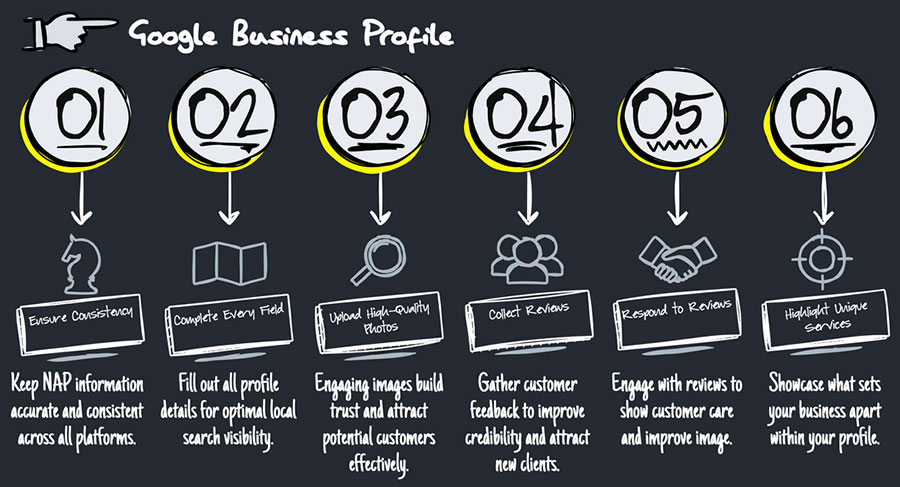If you’ve ever felt like your local business is the best-kept secret in town, it might be time for a proper Local SEO audit. Not the kind where you glance at your Google Business Profile and call it a day. I’m talking about a full, strategic evaluation; one that uncovers hidden opportunities, exposes blind spots, and gives you a clear roadmap for ranking higher, driving more foot traffic, and ultimately growing your business.
Local SEO Audits for Businesses are more than a checklist, they’re a playbook for visibility. And in today’s competitive digital space, visibility means everything. So whether you’re running a single-location business or managing multiple storefronts, this deep dive will walk you through actionable steps you can take right now to build a stronger local search presence.
Let’s get into it.
Start With the Foundation: Your Google Business Profile
Your Google Business Profile is the front door to your online presence. It’s the first impression many customers will have, and it often dictates whether they choose you—or your competitor down the street.
Here’s how to start:
- Ensure Consistency: Make sure your business name, address, and phone number (NAP) are accurate and consistent with what’s listed on your website. Even small discrepancies can hurt your local rankings.
- Complete Every Field: Fill out everything—services, hours, description, categories, attributes, and Q&A. The more complete your profile, the more relevant you’ll be in local search results.
- Upload High-Quality Photos: Real, updated photos of your business, team, and services create trust and engagement.
- Collect and Respond to Reviews: Responding to reviews (yes, even the tough ones) shows Google and your customers that you’re engaged and care.
If you’re missing any of these, it’s time to tighten it up.

On-Page SEO Still Matters for Local
Local SEO Audits for Businesses must include a thorough review of your website’s on-page elements. Google’s algorithm connects the dots between your site and your local listings—so if those dots don’t line up, you’re leaving rankings on the table.
Here’s what to look at:
- Page Titles and Meta Descriptions: Include your primary keyword and city or region in the title tag of each local service page.
- Local Landing Pages: Each location or service area should have its own optimized page with relevant local content.
- Schema Markup: Implement LocalBusiness schema to help Google better understand your business details.
- Internal Linking: Use strategic internal links to connect your homepage, service pages, and location pages.
- Mobile Optimization: Most local searches happen on mobile. If your site doesn’t load quickly or display properly, you’re losing leads.
Local SEO Audits for Businesses should never overlook technical SEO. Slow-loading pages, broken links, or confusing navigation can undercut even the best content.
Review and Clean Up Citations
Citations are mentions of your business name, address, and phone number across online directories. When done right, they build trust with search engines. When inconsistent or outdated, they confuse both algorithms and customers.
Audit your citations by:
- Running a Consistency Check: Compare your listings across major directories (Yelp, Apple Maps, Bing, YellowPages, etc.)
- Fixing Errors: Update incorrect NAP data. If a former address or old phone number is still floating around, it needs to go.
- Removing Duplicates: Having more than one listing per site can split your ranking authority.
This is one of those areas that’s easy to ignore but can quietly sabotage your local SEO performance.
Local Content Strategy: Be the Local Authority
Content plays a major role in Local SEO Audits for Businesses. But not just any content—localized, relevant, and strategic.
Here’s how to approach it:
- Answer Local Questions: Create blog posts or FAQs around real customer questions in your area.
- Highlight Community Involvement: Showcase your participation in local events, partnerships, or charitable causes.
- Create Location-Specific Service Pages: Don’t try to stuff every city into one page. Break it down by location and service.
- Use Local Landmarks: Mention known neighborhoods, streets, or landmarks to increase geo-relevance.
A well-executed content strategy makes your business feel like part of the community—and search engines pick up on that.
Backlinks Still Matter (Especially Local Ones)
Getting high-quality backlinks from local sources can make a huge difference in your rankings. These are some of the most underutilized opportunities in Local SEO Audits for Businesses.
- Sponsor Local Events: Get a backlink from the event website.
- Join Local Chambers or Associations: Many have member directories with links.
- Pitch Local Press: If you’ve got a unique story, reach out to local bloggers or journalists.
- Collaborate with Other Local Businesses: A joint promotion or referral page can lead to natural linking.
Backlinks don’t just boost authority—they build relationships.
Audit Your Google Analytics and Search Console Setup
A solid local SEO strategy is data-driven. If your tracking setup is off, you’re flying blind.
Make sure:
- Google Analytics Is Configured Properly: Set up goals for contact form submissions, phone clicks, and appointment bookings.
- Google Search Console Is Connected: Review which queries are driving impressions and clicks to your local pages.
- UTM Parameters Are Being Used: For any ads or links pointing to your site, use UTM tags to track performance.
- Conversion Tracking Works Across Devices: Test your forms and buttons from mobile, tablet, and desktop.
You can’t improve what you don’t measure. This step is critical.
Monitor and Improve Your Review Strategy
Reviews are one of the most powerful ranking and conversion tools in local SEO. Yet many businesses treat them as a one-time ask.
Instead, build an ongoing strategy:
- Automate Review Requests: Use follow-up emails or SMS after appointments or purchases.
- Respond Promptly: Acknowledge every review, good or bad.
- Highlight Reviews on Your Website: Create a testimonials page or add reviews to your service pages.
- Flag and Report Fake Reviews: Don’t let false information damage your reputation.
When it comes to Local SEO Audits for Businesses, your review strategy should be as polished as your homepage.
Bonus Tip: Run a Competitor Audit
Want to know what’s working? Look at who’s ranking.
- Search for Your Keywords: Who consistently ranks in the map pack and organic results?
- Check Their Backlinks: See where they’re getting authority.
- Analyze Their Content: What are they writing about that you’re not?
- Review Their Google Business Profile: Look at their categories, photos, and reviews.
You’re not copying—you’re finding opportunities they missed.
Let’s Bring It All Together
Local SEO Audits for Businesses aren’t just a nice-to-have—they’re essential if you want to stand out and compete. This isn’t a one-time fix. It’s a regular part of doing business in the digital age.
And yes, it takes time. But the payoff? More visibility. More traffic. More customers walking through your door.
If you’re ready to take a deeper dive into your local SEO performance, let’s talk.
Schedule a consultation today at Here!
And while you’re at it, connect with me on LinkedIn: linkedin.com/in/jonathansearle
Let’s unlock your local potential—together.

